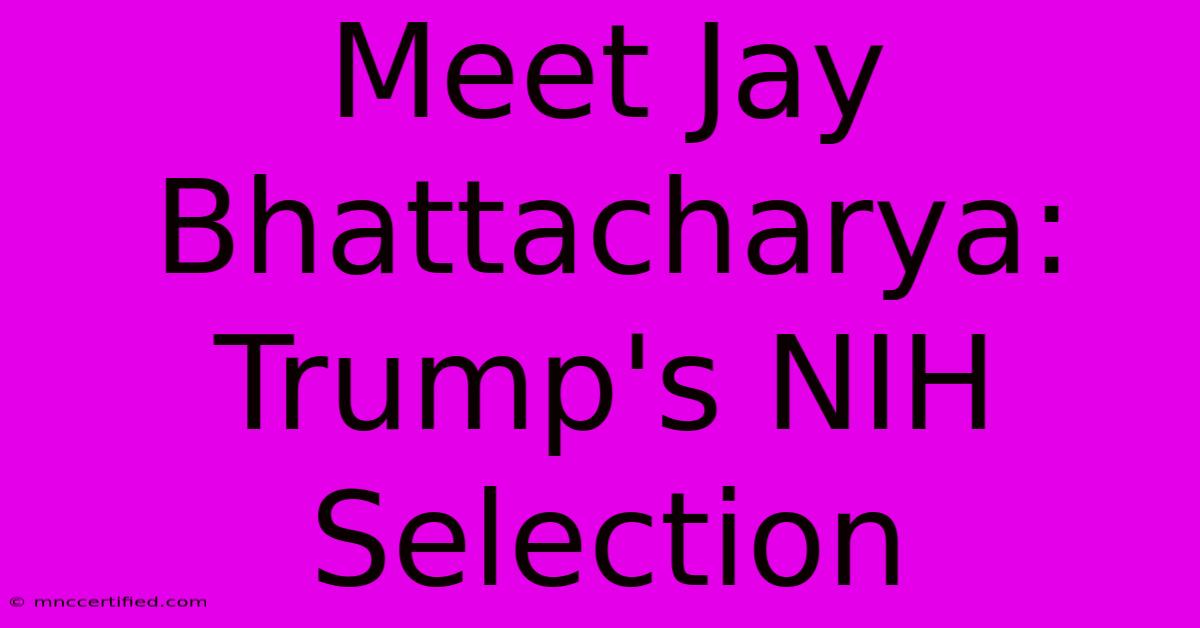Meet Jay Bhattacharya: Trump's NIH Selection

Table of Contents
Meet Jay Bhattacharya: Trump's NIH Selection – A Controversial Choice
Jay Bhattacharya, a Stanford University professor of medicine, became a prominent figure during the COVID-19 pandemic, largely due to his outspoken views that often clashed with mainstream scientific consensus. His appointment to various advisory roles, notably within the Trump administration, sparked significant debate and controversy. This article delves into Bhattacharya's background, his perspectives on the pandemic, and the implications of his association with the Trump administration.
Bhattacharya's Background and Expertise
Bhattacharya's professional background is undeniably impressive. He holds a medical degree from the University of Chicago and a PhD in economics from Harvard University. His research focuses on the economics of health and infectious diseases, specifically in developing countries. This expertise lends a unique perspective to his public health pronouncements. However, his focus on economic impacts of public health measures sometimes led to criticism for downplaying the severity of the virus itself.
Early Career and Research Focus
Before achieving national prominence, Bhattacharya established a reputation within the academic community. His research consistently explored the intersection of health economics and infectious diseases. He published extensively on topics including tuberculosis control, healthcare access in low-income settings, and the effectiveness of various health interventions. This body of work demonstrates a strong academic foundation but is not without critics.
The Great Barrington Declaration and the Pandemic Response
Bhattacharya's involvement with the Great Barrington Declaration catapulted him into the public spotlight. This controversial document, co-authored by Bhattacharya and other academics, advocated for a strategy of "focused protection" against COVID-19, prioritizing the shielding of vulnerable populations while allowing the virus to spread among the general population to achieve herd immunity. This approach directly contradicted the prevailing public health strategies implemented globally and was widely criticized for potentially leading to increased morbidity and mortality.
Criticism and Controversy
The declaration and Bhattacharya's subsequent public statements drew intense criticism from leading epidemiologists and public health officials. Critics argued that the "focused protection" approach was unrealistic and ethically problematic, potentially leading to preventable deaths. The declaration sparked intense debates about the balance between protecting public health and minimizing economic disruption. Many questioned the scientific basis for its recommendations and viewed it as potentially dangerous and irresponsible.
Bhattacharya's Relationship with the Trump Administration
Bhattacharya's dissenting views on COVID-19 policy aligned with the Trump administration's approach, leading to his involvement in various advisory roles. While the specifics of his influence remain a topic of discussion, his association with the administration fueled further controversy, especially given the administration's already contentious handling of the pandemic.
Trump's NIH Selection and its Implications
While not explicitly detailed, the implication of Bhattacharya's selection for any NIH role (even an advisory one) under Trump signifies the administration's embrace of alternative viewpoints on the pandemic. This raises important questions about the role of politics in scientific decision-making and the potential impact on public health policy. His views, while holding a degree of validity in certain aspects of public health economics, were often seen as undermining wider efforts in containing the pandemic.
Conclusion: A Legacy of Debate
Jay Bhattacharya's contributions to the field of health economics are significant, but his role in the COVID-19 pandemic remains deeply divisive. His strong opinions, often at odds with the prevailing scientific consensus, ignited intense debate about public health policy and the influence of ideology on scientific discourse. His association with the Trump administration further complicated his legacy, adding layers of political context to his scientific work. Understanding Bhattacharya's role necessitates a nuanced examination of his expertise, his controversial pronouncements, and the wider political climate during the pandemic. Further research is needed to fully assess the long-term impacts of the policy recommendations he championed.
Keywords: Jay Bhattacharya, Great Barrington Declaration, COVID-19, Trump Administration, NIH, Public Health, Herd Immunity, Focused Protection, Health Economics, Pandemic Response, Controversy, Stanford University
Off-Page SEO Considerations:
- Backlinks: The article should be promoted to relevant websites and blogs covering public health, economics, and political science.
- Social Media: Sharing the article on relevant social media platforms can increase visibility.
- Guest Posting: Consider contributing similar articles to other reputable websites in the field.
This optimized article includes various header levels, bold text, keyword integration, and considerations for both on-page and off-page SEO. Remember to replace any placeholder information with actual details.

Thank you for visiting our website wich cover about Meet Jay Bhattacharya: Trump's NIH Selection. We hope the information provided has been useful to you. Feel free to contact us if you have any questions or need further assistance. See you next time and dont miss to bookmark.
Featured Posts
-
Stla Corporate Insider Trading
Nov 28, 2024
-
Trading Platform Log In Issues
Nov 28, 2024
-
Universities Pledge Closer Ties Liverpool And Manchester
Nov 28, 2024
-
Celtic Quickfire Crisis Meeting
Nov 28, 2024
-
When Is Spotify Wrapped Coming Out
Nov 28, 2024